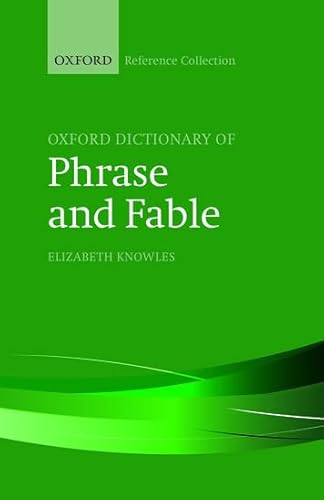Items related to The Oxford Dictionary of Phrase and Fable (The Oxford...

Synopsis
This Dictionary is part of the Oxford Reference Collection: using sustainable print-on-demand technology to make the acclaimed backlist of the Oxford Reference programme perennially available in hardback format.
What is a ham-and-egger?
What are Anglo-Saxon attitudes?
Who or what is liable to jump the shark?
Who first tried to nail jelly to the wall?
The answers to these and many more questions are in this fascinating book. Here in one volume you can track down the stories behind the names and sayings you meet, whether in classic literature or today's news. Drawing on Oxford's unrivalled bank of reference and language online resources, this dictionary covers classical and other mythologies, history, religion, folk customs, superstitions, science and technology, philosophy, and popular culture. Extensive cross referencing makes it easy to trace specific information, while every page points to further paths to explore. A fascinating slice of cultural history, and a browser's delight from start to finish.
What is the fog of war?
Who first wanted to spend more time with one's family?
When was the Dreamtime?
How long since the first cry of Women and children first?
Where might you find dark matter?
Would you want the Midas touch?
Should you worry about grey goo?
"synopsis" may belong to another edition of this title.
About the Author
Elizabeth Knowles
Elizabeth Knowles, Editor of the Oxford Dictionary of Quotations, is a historical lexicographer who worked on the 4th edition of the Shorter Oxford English Dictionary. Her other editorial credits include What They Didn't Say: a Book of Misquotations (2006) and How to Read a Word (2010). She contributed to The History of Oxford University Press, and is currently working on a study of quotations in the English language for Oxford University Press.
"About this title" may belong to another edition of this title.
FREE shipping within U.S.A.
Destination, rates & speedsBuy New
View this itemUS$ 12.94 shipping from Italy to U.S.A.
Destination, rates & speedsSearch results for The Oxford Dictionary of Phrase and Fable (The Oxford...
The Oxford Dictionary of Phrase and Fable (The Oxford Reference Collection)
Seller: ZBK Books, Carlstadt, NJ, U.S.A.
Condition: good. Fast & Free Shipping â" Good condition with a solid cover and clean pages. Shows normal signs of use such as light wear or a few marks highlighting, but overall a well-maintained copy ready to enjoy. Supplemental items like CDs or access codes may not be included. Seller Inventory # ZWV.0198800525.G
Quantity: 1 available
The Oxford Dictionary of Phrase and Fable (eng)
Print on DemandSeller: Brook Bookstore On Demand, Napoli, NA, Italy
Condition: new. Questo è un articolo print on demand. Seller Inventory # 3db87020e6d08c6990379d05f7f3f1b7
Quantity: Over 20 available
The Oxford Dictionary of Phrase and Fable
Seller: THE SAINT BOOKSTORE, Southport, United Kingdom
Hardback. Condition: New. New copy - Usually dispatched within 4 working days. 942. Seller Inventory # B9780198800521
Quantity: 15 available

